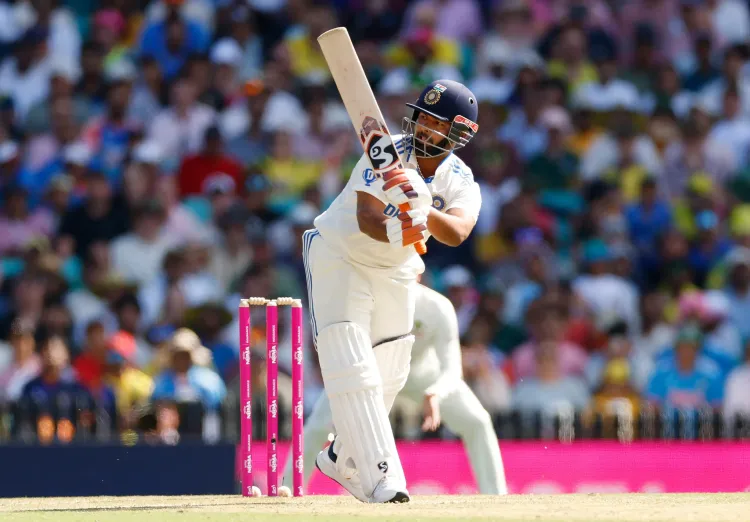Challenging to Accept BGT Series Defeat, Batters Must Shoulder Responsibility: Sunil Joshi

New Delhi, Jan 9 (NationPress) The Border-Gavaskar Trophy has returned to Australia after a ten-year hiatus, marking a setback for India’s ambition of achieving a three-peat of Test series victories on Australian soil. The tour revealed a significant issue with India’s batting, as they struggled to surpass the 200-run threshold in six out of nine matches.
While players like Yashasvi Jaiswal, Nitish Kumar Reddy, and to a lesser extent, KL Rahul showed flashes of brilliance, the overall batting performance lacked consistency, substantial scores, and effective partnerships. Rohit Sharma, Virat Kohli (aside from his century in Perth), and Shubman Gill faced considerable challenges, with Rishabh Pant also struggling throughout the series.
This disappointing batting display continued the trend of uncertainty surrounding India’s batting unit, especially following their 3-0 loss to New Zealand at home.
Sunil Joshi, former India spinner and chief selector during the team’s 2-1 series victory in the 2020/21 tour, expressed his discontent over the batting failures in the recent 3-1 defeat to Australia.
"It’s quite difficult to digest, but the batters must take responsibility. The coaching staff also needs to find effective ways to communicate with the players, whether through direct or subtle methods. It’s a tough reality we must accept. Every player on that tour understands the significance of representing India.
"They always strive to perform their best, but sometimes it doesn’t materialize. Hence, players must be advised on what adjustments they need to make regarding patience and refining their skills and techniques. Observing the dismissals of our top six batters across all five Test matches, I see no noticeable change in their approach.
"The patterns of dismissals were alarmingly similar, and while I acknowledge that Australian players also fell in similar fashion, the key difference was the partnerships they established and their top order consistently taking responsibility. Furthermore, we must also address our fielding, which has been a concern," Joshi remarked in an exclusive interview with IANS.
Another significant issue was the selection of all-rounders predominantly based on their batting rather than their bowling capabilities. Joshi argued that India should have fielded five genuine bowling options in Australia and reiterated how the batting failures intensified the pressure on the bowlers.
"To win matches overseas or even domestically, like the Ranji Trophy, it’s essential to have five bowlers. Relying on four bowlers is insufficient, especially if your top six batters and subsequent lower-order batters fail to accumulate runs. In such cases, you need five reliable bowlers who can secure 20 wickets to win Test matches.
"Consider the workload on Bumrah during the five Test matches—he bowled over 150 overs. Had we limited his overs to around 60 or 65, his effectiveness could have significantly increased. In this series, Bumrah was relied upon heavily, and in the last Test match, when he was sidelined due to back spasms, the team appeared quite ordinary.
"Competing in Australia is a tremendous challenge; it’s arguably the toughest away tour, demanding that players bring their absolute best. In a previous Test match, Bumrah had to leave the field briefly, and thankfully, he returned. Concerns about his injuries were valid, as he is pushing himself to the limit with every delivery.
"I’m not suggesting the blame lies solely with the batters or bowlers; it’s a collective team responsibility. As a unit, they underperformed and lost the series, so acceptance is vital. There’s no merit in singling out individuals. The top six batters needed to generate runs to provide bowlers the opportunity to claim 20 wickets. Without scoring runs, it becomes increasingly difficult for the bowlers," he stated.
Joshi further emphasized that the Indian bowlers’ recovery during the Australian tour was adversely affected by the batters not providing lengthy innings. "If you analyze how often the bowlers were on the field during the series, they barely had two full days of rest. They found themselves bowling almost every day or for one and a half days. Consistently bowling 15, 17, 18, or even 20 overs hampers their ability to maintain intensity because the body requires recovery time.
"Moreover, they were also fielding for 90 overs, which adds significant strain on their bodies. To keep them fresh, our batters needed to score runs and bat for 90, 120, or even 140 overs. Had they achieved that, they could have posted scores exceeding 400 runs, which was sorely lacking," he concluded.









